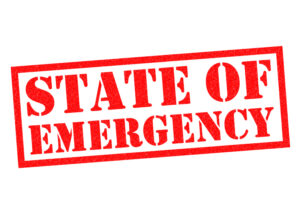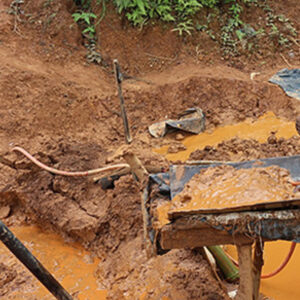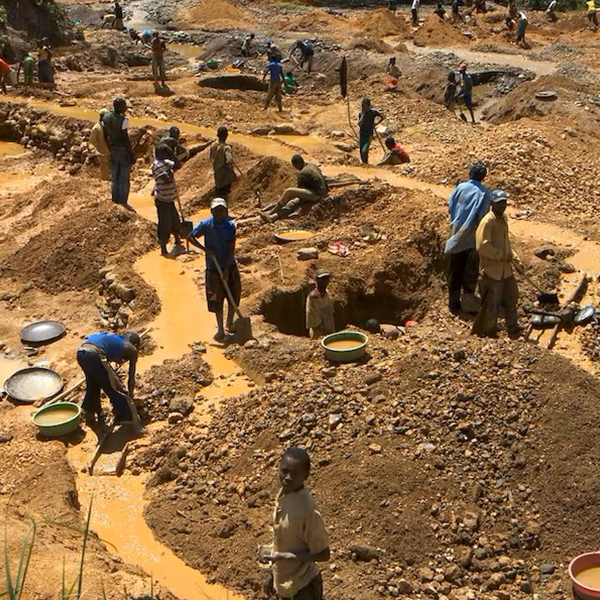Illegal mining, locally known as “galamsey”, is no longer just a challenge in Ghana—it is a national crisis. Rivers are turning brown, forests are vanishing, food security is under threat, and the soul of our land is bleeding. For over a decade, “galamsey” has gnawed away at the foundations of our environment, our economy, and our future. Today, the nation stands at a crossroads: _Should Ghana declare a State of Emergency to confront illegal mining once and for all?

Understanding the Real Picture: The Two Faces of “Galamsey”
From personal observations and analysis of ground realities, it’s clear that “galamsey” has two distinct faces. On one side are desperate youth, some with no formal education or job opportunities who are driven into illegal mining as a means to survive and support their families. On the other side lies a darker force: a cartel of well-financed, politically connected actors who use “galamsey” to enrich themselves, all while destroying Ghana’s water bodies and forest reserves with impunity.
These financiers are not faceless. They include some politicians, business tycoons, and foreign nationals often from China and other countries who have mastered the art of evading accountability. The most tragic part is that their children will grow up boasting of their parents’ “hard work,” while the children of those who stood against this destruction inherit a broken nation.
Government Efforts and the Public Skepticism
The current government has made efforts some of which deserve recognition to clamp down on “galamsey”. Deployment of military task forces, seizure of excavators, and awareness campaigns have been rolled out. However, many Ghanaians remain unconvinced. To them, the results are minimal compared to the rate of devastation.
A key source of public disappointment is the government’s failure to repeal the Legislative Instrument (LI 2462), which permits the President to grant mining leases in forest reserves. This repeal was a core campaign promise. Instead of repealing the law, the government is now proposing an amendment, a move many see as a political U-turn, if not a betrayal.
Let me ask this; was this campaign promise made with full due diligence, or was it just political rhetoric to win votes? The silence around this is deafening.
Declare a State of Emergency? What It Means and What It Takes
The call for declaring a state of emergency has been echoed by several organisations and civil society actors, including the Ghana Chamber of Mines, the Peasant Farmers Association of Ghana, and the OccupyGhana movement. But what does this actually mean?
Under Article 31 of Ghana’s 1992 Constitution, a State of Emergency can be declared when the nation faces a situation that threatens the life of the state, such as natural disasters, war, internal insurrection, or any breakdown of public order. This gives the President sweeping powers to restrict movement, impose curfews, deploy the military more aggressively, and suspend certain civil liberties in the interest of restoring order.
But declaring a state of emergency is not just a pen stroke. It requires:
• Parliamentary approval
• A clear national consensus
• Readiness of security agencies
• Adequate financial resources to support enforcement and restoration
• Safeguards to protect innocent civilians from abuse
Ghana has rarely invoked a state of emergency in its Fourth Republic. One notable instance was in 1983 during the drought and famine crisis. In more recent African history, Nigeria declared a state of emergency in several states between 2013 and 2015 due to the Boko Haram insurgency, and South Africa did so briefly during the COVID-19 pandemic. These examples show that while it is a powerful tool, its effectiveness depends on context, preparation, and political will.

The Voices of Concern: Are We Ready?
Last week, while on my way home after work, my boss tune the radio to a channel where an interview discussion on national security relating to the “declare State of Emergency” (exact platform, names of interviwees and time unclear), a seasoned security analyst expressed reservations about Ghana’s readiness. He cited the lack of coordinated inter-agency response and the socio-economic implications of such a move. A spokesperson from the presidency, also interviewed, echoed the concern, saying:
“Declaring a state of emergency alone won’t solve the “galamsey” problem. The root cause is unemployment, and if we don’t tackle that, we’ll only be shifting the crisis from one form to another.”
Indeed, if we simply displace thousands of young illegal miners without creating viable alternatives, we risk birthing a new wave of crime, banditry, or extremism. “Galamsey” is not just an environmental crisis, it is a youth employment crisis, a governance failure, and a moral indictment.
A Multi-Ministerial Response is Non-Negotiable
If a state of emergency is ever to be declared, it must not be a solo effort by the Ministry of Lands and Natural Resources. A national emergency demands a whole-of-government approach. We must see coordinated planning involving:
• Ministry of Interior & National Security: for tactical and strategic law enforcement.
• Ministry of Employment & Labour Relations / NYA: to deploy immediate alternative employment for affected youth.
• Ministry of Lands and Natural Resources: to implement genuine land reclamation and policy reforms.
• Ministry of Foreign Affairs: to deal with the involvement of foreign nationals.
• Ministry of Finance: to ensure that the national budget can support the operations needed.
• Ministry of Education: to ramp up public education and create awareness of environmental protection in our schools.
Conclusion: The Clock Is Ticking
“Galamsey” has become a national canker. It is eating into our rivers, our lands, our food systems, and our future. Whether or not a state of emergency is declared, urgent, well-coordinated action must be taken now. We must stop politicising this crisis and start nationalising the response.
If the government is truly consulting across ministries and stakeholders to ensure that any emergency declaration delivers the results we seek, then Ghanaians must be ready to support such a bold move.
Let us call it what it is: This is not a party issue. This is a Ghana issue. And we must rise together to stop it.
Stop “Galamsey” now—before it stops us all.
By Isaac K. Odjidja–Youth Development Advocate





